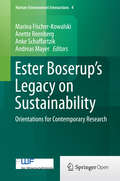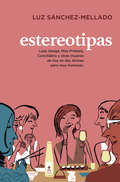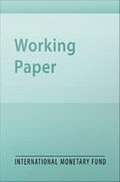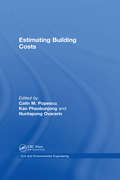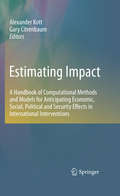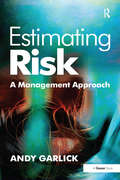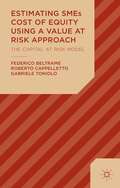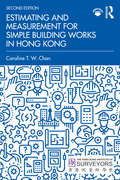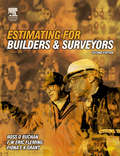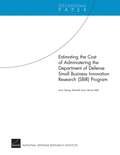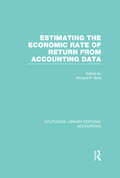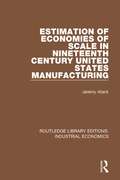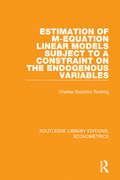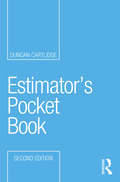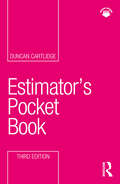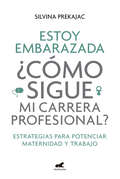- Table View
- List View
Estate Planning, 5E (Idiot's Guides)
by Stephen MapleAnyone with assets and heirs needs a will to determine what will happen to their property and plan for the welfare of their children should they pass away unexpectedly. As people age, they tend to think more seriously about having a will and planning their estates, to help their heirs, and to give them the maximum amount of money possible. This book makes it easy to understand all the issues surrounding estates, and to draft a will. This book covers: • An introduction to the important concepts of estate planning and vital information on how to get started on a plan. • Valuing your property and assets, including businesses and self-employment issues. • Getting the most from life insurance, pensions, and retirement savings. • Creating a will and trusts, and learning how probate works. • Looking after minor children in the event of your death, planning for special situations such as divorce and bankruptcy, and avoiding family feuds over inheritance. • Everything you need to know about taxes: estate, gift, state and federal income—and how to ensure that your heirs receive the assets you have intended for them. • Planning for retirement, including Social Security benefits, power of attorney, and health care directives.
Estate Sales Made Easy
by Victoria GrayFrom first client contact to signed contract, and from setup to day of sale to takedown, Victoria Gray—an experienced estate sales manager and founder of Estate Sales by Victoria—guides you through what it takes to run a successful estate sale. With a thorough exploration of the legal, financial, familial, and business issues, Gray lays out the nuts and bolts of an estate sale with sensitivity to emotions that might arise during the process. Gray also delves into the spiritual energy that she has sensed in different houses throughout her 27 years in the business.With insightful tips and an easy-to-follow process, you will be equipped to: •Set up appointments with potential clients seeking an estate sale manager •Create a contract for the sale •Set up the sale, including pricing and arranging items for maximal efficiency and profit •Manage the sale, from client to customer •Take down the sale and distribute the proceeds •Build your customer base and keep itGray's efficient, no-nonsense advice will help you to tackle your first estate sale with little fuss and a full sense of preparation. Whether you want to establish your own estate sales business or conduct an estate sale for a loved one, this guide provides everything you need to know from an experienced manager who has seen it all.
Ester Boserup's Legacy on Sustainability
by Andreas Mayer Marina Fischer-Kowalski Anette Reenberg Anke SchaffartzikArising from a scientific conference marking the 100th anniversary of her birth, this book honors the life and work of the social scientist and diplomat Ester Boserup, who blazed new trails in her interdisciplinary approach to development and sustainability.
Estereotipas: Lady Ganga, Miss Prótesis, Conciliátrix y otras mujeres de hoy en día
by Luz Sánchez-MelladoIngeniosas, incisivas, inmisericordes, brutalmente divertidas, las ESTEREOTIPAS provocan la carcajada instantánea contándonos su vida. Se ríen de todos y de todas, pero sobre todo de ellas mismas. Exprimir ofertas y rebajas y convertirse en Lady Ganga; sacar el máximo partido al propio cuerpo aunque sea con trampa para proclamarse Miss Prótesis; cumplir años con clase y bregar con las nuevas tecnologías para que no te llamen Patética Viejuna; mudarse a los suburbios y sobrevivir como especie Periférica y Adosada; divorciarse y volver al mercado de las Depredadoras y Presas; tirarse a la yugular de la mejor amiga, la ex del novio o la suegra de marras como una buena Hermana Loba; combatir el estrés con la armadura de Conciliátrix, la superheroína que compatibiliza el trabajo con la familia, y poder contarlo todo con pelos, señales, glorias y miserias, orgullosa de ser una Incontinente Verbal, y a mucha honra. Así es el mundo bipolar de las ESTEREOTIPAS: les han dicho desde la cuna que tienen que ser perfectas y lo peor es que se lo han creído a pies juntillas. Luchan cuerpo a cuerpo en la jungla de la vida y casi siempre salen perdiendo, pero con dignidad y estilo. Contradictorias y coherentes, mezquinas y sublimes, cobardes y audaces, capaces de lo mejor y lo peor para salvar el pellejo y el tipo. Divinas, pero muy humanas.
Esterline Technologies: Lean Manufacturing
by Richard L. Nolan Karen A Brown Subodha KumarRaises the issue of the appropriate role of IT in lean manufacturing. Most large manufacturing companies have implemented ERP IT systems to support lean manufacturing practices. The Kerry plant of Esterline Technologies attempted an ERP implementation and then terminated it. Now the Kerry plant is revisiting the appropriate use of IT in an environment of highly innovative lean manufacturing.
Estimates of the Output Gap in Armenia with Applications to Monetary and Fiscal Policy
by Anke Weber Asmaa El-GanainyA report from the International Monetary Fund.
Estimating Building Costs (Civil and Environmental Engineering)
by Calin M. Popescu Nuntapong Ovararin Kan PhaobunjongCompanies live or die on the basis of estimating their costs. Preparing estimates and bidding for new jobs is a complex and often costly process. There is no substitute for on the job training -- until now. Drawing on the authors' combined experience of more than 70 years, Estimating Building Costs presents state-of-the-art principles, practices, a
Estimating Equilibrium Exchange Rates for Armenia and Georgia
by Omar Alshehabi Shuang DingA report from the International Monetary Fund.
Estimating Impact
by Alexander Kott Gary CitrenbaumVirtually all human endeavors can be analyzed and modeled and understood through computer-aided study, and that is very much at the core of operations research, game theory, and decision science. Understanding the potential impact of any action is critical to the success of that action, and in ESTIMATING IMPACT Alexander Kott and Gary Citrenbaum, with a stellar group of contributors, demonstrate how military or humanitarian interventions (or the decision not to intervene) can be rigorously analyzed beforehand and their likely impacts and ramifications predicted at levels appropriate to their scope. A wide range of modeling programs are available that support plan assessment and impact forecast, and they allow accurate prediction within an interdependent set of political, military, economic, social, information, and infrastructure systems, and experts involved in the use and development of these tools demonstrate how, when, and why they should be used.
Estimating Process Times: The Role of Time Equations
by Robert S. Kaplan Steven R. AndersonThis chapter focuses on the principle innovation of TDABC, the development of equations that estimate the demands for time on capacity resources, and the benefits of implementing this method of analysis.
Estimating Risk: A Management Approach
by Andy GarlickAndy Garlick's book explores the role of quantitative techniques in modern risk management. Risk management has grown in importance in most organisations in the last 20 years, but in many remains simply a matter of processing lists of risks and actions. The author argues that this fails to make the most of the techniques available and that organisations can improve their risk decision making by using risk models. His book describes a broad range of modelling techniques, all illustrated by business-relevant examples. The role of the models in decision making is also discussed, with particular emphasis on what the risk premium - the price people charge for accepting risk - is and should be. In order to provide a self contained account the underpinning material from probability and decision theory is also included, so that the book will provide a handy reference guide for all practitioners. The discussion is consistently informal, and the book provides a critical view of the accepted wisdom in risk management. This book will enable managers and their specialist advisors to improve their approach to risk whilst removing the mystique.
Estimating Smes Cost Of Equity Using A Value At Risk Approach
by Federico Beltrame Roberto Cappelletto Gabriele TonioloAs well as reviewing traditional models, this book proposes an alternative model for estimating the cost of risk capital. This model, known as CaRM (Capital at Risk Model), bases the cost estimate of risk capital on VaR (Value at Risk) for the very first time. This book is an ideal resource for developing valuation research in SMEs.
Estimating and Costing for the Metal Manufacturing Industries
by Robert Creese M. AdithanThis practical reference/text provides a thorough overview of cost estimating as applied to various manufacturing industries, with special emphasis on metal manufacturing concerns. It presents examples and study problems illustrating potential applications and the techniques involved in estimating costs.;Containing both US and metric units for easy conversion of world-wide manufacturing data, Estimating and Costing for the Metal Manufacturing Industries: outlines professional societies and publications dealing with cost estimating and cost analysis; details the four basic metalworking processes - machining, casting, forming, and joining; reveals five techniques for capital cost estimating, including the new AACE International's Recommended Practice 16R-90 and the new knowledge and experience method; discusses the effect of scrap rates and operation costs upon unit costs; offers four formula methods for conceptual cost estimating and examines material-design-cost relationships; describes cost indexes, cost capacity factors, multiple-improvement curves, and facility cost estimation techniques; offers a generalized metal cutting economics model for comparison with traditional economic models; and more.;Estimating and Costing for the Metal Manufacturing Industries serves as an on-the-job, single-source reference for cost, manufacturing, and industrial engineers and as a text for upper-level undergraduate, graduate, and postgraduate students in cost estimating, engineering economics, and production operations courses.;A Solutions manual to the end-of-chapter problems is available free of charge to instructors only. Requests for the manual must be made on official school stationery.
Estimating and Measurement for Simple Building Works in Hong Kong
by Caroline T. ChanThis book is an introductory text on building measurement and estimating for simple buildings in Hong Kong, based on the Hong Kong Standard Method of Measurement of Building Works 4th Edition Revised 2018 (HKSMM4 Rev 2018). It provides a toolkit for students and surveying technicians who are new to the subject. This second edition updates the contents in line with the HKSMM4 Rev 2018 and incorporates the latest industry developments such as BIM. The main text is divided into five parts following the development of a typical project. Part 1, Building the project team, introduces the team setup for a typical project. Part 2, Deciding the procurement strategy, explains the various procurement decisions to be made by an employer before any cost estimating and measurement work takes place. Part 3, Preparing for tender, covers the tendering methods, tender documentation and approximate estimating techniques used by Quantity Surveyors. Part 4, Measuring quantities, introduces measurement principles and HKSMM4 Rev 2018, followed by a detailed review of the measurement methods for each major trade, with worked examples. Part 5, Estimating unit rates, explores the basic techniques for unit rate preparation. The book contains worked examples from real Hong Kong building projects, self-assessment questions, reminders and points of note. It is essential reading for Hong Kong construction and surveying students, international Quantity Surveyors working in the local area and those wanting international examples of Quantity Surveryors practice.
Estimating for Builders and Surveyors
by Fiona Grant Eric Fleming R D BuchanWritten for students taking courses in building and surveying, 'Estimating for Builders and Surveyors' describes and explains the method used by the estimator to build up prices or rates for items described in the SMM7 format. Each chapter is a self-contained unit related to a particular element in the building. Worked examples throughout reflect both traditional and up-to-date technology. Written by an author team of academics and professional surveyors, this book continues to be an invaluable introduction to the subject of estimating.
Estimating the Cost of Administering the Department of Defense Small Business Innovation Research (SBIR) Program
by Somi Seong Kenneth Horn Bruce J. HeldCurrently, Small Business Innovation Research (SBIR) funds cannot be used to administer the SBIR program; SBIR administration must be funded from other sources. As Congress reauthorizes the program, it is considering whether to allow partial use of SBIR set-asides for SBIR program administration costs and, if so, at what levels. In this report, the authors estimate how much it currently costs to administer the DoD SBIR program.
Estimating the Economic Rate of Return From Accounting Data (Routledge Library Editions: Accounting)
by Richard P. BriefPublished between 1965 and 1985 the papers in this collection address the problem of using accounting data to estimate the economic rate of return. The search for a solution to this problem has been an important episode in the history of accounting thought. The papers reprinted in this volume are the foundation of this intellectual effort. Ten articles and six notes and comments are reprinted here. Seven of the papers were published in UK journals and the rest in US publications. Bringing them together in one book will facilitate research on this important subject.
Estimation of Economies of Scale in Nineteenth Century United States Manufacturing (Routledge Library Editions: Industrial Economics #5)
by Jeremy AtackOn economies of scale during the nineteenth century, much is assumed, but little is known. This study, first published in 1985, seeks to close this gap in our knowledge by providing comprehensive empirical evidence on the status of economies of scale in mid-nineteenth century manufacturing industry. This evidence is in the form of production function estimates made using data from the manuscripts of the federal censuses of manufacturing for 1850, 1860 and 1870.
Estimation of M-equation Linear Models Subject to a Constraint on the Endogenous Variables (Routledge Library Editions: Econometrics #13)
by Charles Stockton RoehrigOriginally published in 1984. This book brings together a reasonably complete set of results regarding the use of Constraint Item estimation procedures under the assumption of accurate specification. The analysis covers the case of all explanatory variables being non-stochastic as well as the case of identified simultaneous equations, with error terms known and unknown. Particular emphasis is given to the derivation of criteria for choosing the Constraint Item. Part 1 looks at the best CI estimators and Part 2 examines equation by equation estimation, considering forecasting accuracy.
Estimator's Pocket Book 2e (Routledge Pocket Books)
by Duncan CartlidgeThe Estimator’s Pocket Book, Second Edition is a concise and practical reference covering the main pricing approaches, as well as useful information such as how to process sub-contractor quotations, tender settlement and adjudication. It is fully up to date with NRM2 throughout, features a look ahead to NRM3 and describes the implications of BIM for estimators. It includes instructions on how to handle: the NRM order of cost estimate; unit-rate pricing for different trades; pro-rata pricing and dayworks; builders’ quantities; approximate quantities. Worked examples show how each of these techniques should be carried out in clear, easy-to-follow steps. This is the indispensable estimating reference for all quantity surveyors, cost managers, project managers and anybody else with estimating responsibilities. Particular attention is given to NRM2, but the overall focus is on the core estimating skills needed in practice. Updates to this edition include a greater reference to BIM, an update on the current state of the construction industry as well as up-to-date wage rates, legislative changes and guidance notes.
Estimator’s Pocket Book (Routledge Pocket Books)
by Duncan CartlidgeThe Estimator’s Pocket Book, Third Edition is a concise and practical reference covering the main approaches to pricing, as well as useful information such as how to process sub-contractor quotations, tender settlement and adjudication. It is fully up to date with the New Rules of Measurement (NRM2) (2nd Edition) throughout and based on up-to-date wage rates, legislative changes and guidance notes.The book includes instructions on how to carry out:· an NRM order of cost estimate,· unit-rate pricing for a range different trades,· pro rata pricing for variations, and· the preparation and pricing of builders’ quantities and approximate quantities.This book is an essential source of reference for quantity surveyors, cost managers, project managers and anybody else with estimating responsibilities.
Esto es una venta inteligente: La única guía de ventas que necesitarás
by Passos Dias AguiarVender de Forma Inteligente y Holgazana para Vender como Locos Si deseas aprender a vender cualquier cosa a cualquier persona, haciendo solo lo que realmente funciona y dejando los problemas a los demás, este libro es para ti. Esta guía concisa se enfoca en conceptos y herramientas comprobadas que cualquier vendedor necesita para lograr el autodominio y desarrollar y perfeccionar sus habilidades de venta. La Matriz de Von Manstein, una herramienta para identificar a los mejores ejecutivos ideada por el genio militar Mariscal de Campo Erich Von Meinstein, explica por qué la combinación de inteligencia y holgazanería es el camino a seguir. Las personas inteligentes y holgazanas piensan antes de actuar, evitan las cosas improductivas, se centran en algunas prioridades clave y saben qué no hacer. ¿Por qué desperdiciarías tu tiempo aprendiendo las 365 formas de manejar objeciones si dominar un puñado se ocupará del 80% de las situaciones? La venta se trata de 7 fundamentos: 1. Autoimagen 2. Metas 3. Concertar citas 4. Construir relaciones 5. Realizar presentaciones persuasivas 6. Manejar objeciones 7. Cerrar el trato El libro presenta algunas técnicas efectivas para dominar cada uno de estos fundamentos. Ya sea que estés comenzando en las ventas, seas un veterano experimentado o te encuentres en algún punto intermedio, esto es todo lo que necesitas para tener éxito en las ventas. Definitivamente, este libro es imprescindible para todos los vendedores. El autor cuenta con más de 30 años de experiencia en ventas y negociación. Como destacado consultor internacional de ventas, lo que lo distingue en la cima de su profesión es su capacidad para producir resultados medibles para sus clientes. Hazte un favor y ¡lee este libro ahora mismo!
Estonia: Transition, EU Membership, and the Euro
by Michael E. Porter Orjan Solvell Christian H.M. KetelsThe case discusses the economic development of Estonia, covering specifically the period from regaining independence from the Soviet Union in 1991 until 2015. It tracks the process from the initial transition towards a market economy to becoming an EU member country, including the 2007 crisis and the government's response to it. The overall performance of the economy, the profile of its key clusters, and the quality of its business environment in 2015 are discussed. The case provides the background for an analysis of policy reforms in a transition economy, the role of legacy and geographical neighborhood for economic development, the implications of EU membership for an EU member country, and the relationship between microeconomic reforms and macroeconomic crisis.
Estoy embarazada ¿Cómo sigue mi carrera profesional?: Estrategias para potenciar maternidad y trabajo
by Silvina PrekajacSilvina Prekajac propone que los hijos y los ascensos no son excluyentes, que la maternidad puede capitalizarse, y que empoderar el ejercicio de la profesión requiere de un proceso de profundo autoconocimiento por parte de la propia mujer y de un acompañamiento activo de las organizaciones. Estoy embarazada. ¿Y ahora qué va a pasar con mi carrera? Una de las profesionales de mi equipo me anunció que va a tener un hijo... ¡todo un tema! Vos ocupate de los chicos y de hacer las cosas de la casa, que yo me encargo de salir a trabajar. Frases que solemos escuchar en el cotidiano y que necesitan de abordajes actuales si queremos organizaciones actuales. Mucho se habla de la necesidad de ser diversos e inclusivos, y de que el contar con representatividad femenina en puestos jerárquicos hace a las organizaciones más eficientes y efectivas en un momento en que quienes no innoven y no se adapten a las nuevas reglas de juego que la cuarta revolución industrial trae consigo difícilmente logren sobrevivir y sostenerse en el tiempo. ¿Pero qué hay de lo que se hace en lo concreto para que las necesidades de la mujer tengan respuesta, y para que el dato según el cual solo un quince por ciento de ellas accede a puestos de decisión se revierta? La maternidad es una de las principales barreras para que los modelos de éxito de vidas integradas entre los intereses profesionales y personales que hoy demandan los futuros líderes tengan visibilidad. Ocho de cada diez ejecutivos así lo reconocen y siete de cada diez dicen que la igualdad de género no es una cuestión estratégica en las organizaciones donde se desempeñan. Es por eso que con este libro, Silvina Prekajac -directora fundadora de Giving Birth, la primera consultora de mentoreo de Argentina concebida para potenciar a las mujeres profesionales en su maternidad- aborda a la maternidad y a la inclusión de la mujer con la mirada de negocio que debe tener para que sea una prioridad en las organizaciones, brindando herramientas y soluciones tangibles con la idea de que siempre sea posible aspirar al máximo potencial de desarrollo profesional. Estas páginas están dirigidas a aquellas mujeres con ganas de ser madres y empoderarse en sus trabajos, o que ya lo han sido y quieren darle un giro a su carrera o a su maternidad, así como también a líderes de organizaciones interesados en incluir a la mujer en puestos de decisión y a hombres que, como futuros o actuales padres, tengan el interés de trabajar en equipo con sus parejas en pos del enriquecimiento mutuo.
Estoy verde: Dólar, una pasión argentina
by Alejandro Bercovich Alejandro RebossioTragedias anunciadas, secretos, alianzas y traiciones, crímenes, delitos impunes, historias increíbles, se reúnen en este libro, que, a fuerza de contar verdades, termina siendo un thriller de los mejores. Objeto de deseo, oasis de poder, instrumento de corrupción, llave maestra, amuleto, ídolo y tabú: para los argentinos, el dólar parece ser todo eso y mucho más. Obsesión patológica o sentido común, el interés por los "verdes" atraviesa la sociedad e invade la vida de todos sin distinguir edades, estudios, oficios o profesiones, riqueza o pobreza. Alejandro Rebossio y Alejandro Bercovich se propusieron echar luz sobre ese fenómeno. Hurgaron en la historia del afán por los "verdes", que comienza antes de lo que muchos creen y que ha desatado más de una psicosis social. Estudiaron las operaciones económicas y los intereses que se esconden detrás de alzas y depreciaciones, fugas y pesificaciones. Investigaron las diversas formas, legales y no tanto, con las que ricos y famosos consiguen las divisas. Las cifras exorbitantes que algunos ganan y muchos perdemos. En este libro circulan varios dólares, además del blue: el moreno, el aníbal, el soja, el tarjeta, el cable, el merca, el casino. Y también unos cuantos personajes que tienen lo suyo para contar: políticos, empresarios, funcionarios y ex funcionarios, economistas y psicoeconomistas, sociólogos, antropólogos, bancarios, "cueveros", "arbolitos", cambistas, financistas, falsificadores, turistas, abogados, proxenetas, inmigrantes, policías, narcotraficantes.


